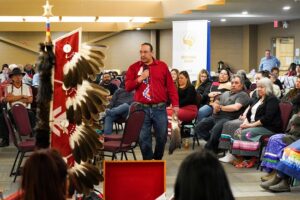Anishinaabe Dodemaag Teachings captivates and inspires learners

By Rick Garrick
LITTLE CURRENT — Chop Waindubence shared semaa (tobacco) with a member of each clan present at the Anishinaabe Dodemaag Teachings gathering to ask permission to share stories and teachings from their clan.
“It is very important that we remember these protocols — if I don’t ask permission first, I cannot speak for these clans, I cannot teach,” says Waindubence, whose father is the late Anishinabek Nation Head Getzit Mishomis Gordon Waindubence (M’Shiikenh)-baa. “When we take care of clan teachings, some of the expectations that we want is learning something new. I’m not going to teach you anything, I’m only reawakening what’s already there in each and every one of you.”
Hosted by Zhiibaahaasing on behalf of B’Maakonigan, the central governing body for the First Nations that have signed the Anishinabek Nation Governance Agreement and others that sign on in the future, and the Anishinabek Nation from March 28-29 at the Manitoulin Hotel and Conference Centre in Little Current, the gathering featured teachings on the Anishinaabe Dodemaag System of Governance; how each dodem (clan) was given a sacred gift, law, and responsibility; the Dodemaag decision-making process and responsibilities based on the Seven-Pointed Star System; and the relationship and importance of the Anishinaabe Sacred Gifts, Ngo Dwe Waangizid Anishinaabe, and the Anishinaabe Chi-Naaknigewin.
“We will never learn everything about Anishinabek because there is too much to know, there are no masters degrees, there is no doctorate in Anishinabek,” Waindubence says. “What I expect from each and every one of you is just to reawaken yourself with what you’re going to hear in the next couple of days.”
Waindubence says his teachings include 42 sub-clans that sit underneath the seven clans represented by banners at the gathering.
“I talked about it this morning how we use these teachings to our benefit, even in the westernized world, and how they’re used with our jobs, with our everyday life, with our home life, even when we go in the bush,” Waindubence says. “Our clans are there, our helpers are there, because we’re going to be talking about our helpers as well.”
Waindubence says he was reminded about the importance of humility earlier in the day on March 28 when some participants were laughing while he was using his striker and flint.
“It was so good to hear them laugh at me this morning, it was funny, I was having a really good time this morning,” Waindubence says. “You have to remember what humility really is. I shared this this morning and I reflect on it now, is that if you can’t laugh at yourself even once a day, there’s something wrong.”
Waindubence says he sits with the Sun Dance society, noting that each of the lodges present at the gathering have different clans.
“These are the things we are going to be discussing today, the differences in between each and every one of these clans,” Waindubence says. “We all have dances, we all have songs, we all have our own specific teachings for our clans and maybe this is a start to learn them for each and every one of you here.”
Waindubence says he is from the Wolf clan but is also a part of the Bear clan because that is where his mother sits.
“As we begin this afternoon I want you to kind of reflect on your own clan, on some of the characteristics of that specific clan,” Waindubence says. “So what I’m going to do right now is I’m going to talk to you about my clan, my songs.”
Waindubence says members of the Wolf clan are often found alone but they are also very family-oriented individuals.
“[When] you look at how they live in the community, they harvest as much as they can and they share with their own family members because that’s what they always did,” Waindubence says. “The leadership of those clans would never eat first, they would let the community eat first, let that clan eat first, and then the leader would take what was left. I kind of laugh at myself because I see myself doing that all the time, I never eat at a gathering, I always let other people eat.”
Waindubence says everybody he has spoken with has at some point wanted to be a part of the Bear clan until they learned about the responsibilities that members of the Bear clan carry.
“When I told them about the responsibilities of that Bear clan, ‘I don’t want to be Bear clan,’” Waindubence says. “When this nation was given many gifts, items to carry, it (the Bear clan) was a part of that justice system, protection of community, protection of people, protection of each and every one of these clans that were here.”
Waindubence’s Anishinaabe Dodemaag Teachings are available on the official Anishinabek Nation YouTube channel.


